Tour Operations Management: Functions, Roles, and Costing
VerifiedAdded on 2023/01/10
|15
|4481
|81
AI Summary
This report analyzes the functions and roles of tour operators in the travel and tourism industry. It explores the process of designing and costing a holiday package and discusses the changes in customer demands. The report also provides insights into the scale and structure of the tour operating industry.
Contribute Materials
Your contribution can guide someone’s learning journey. Share your
documents today.
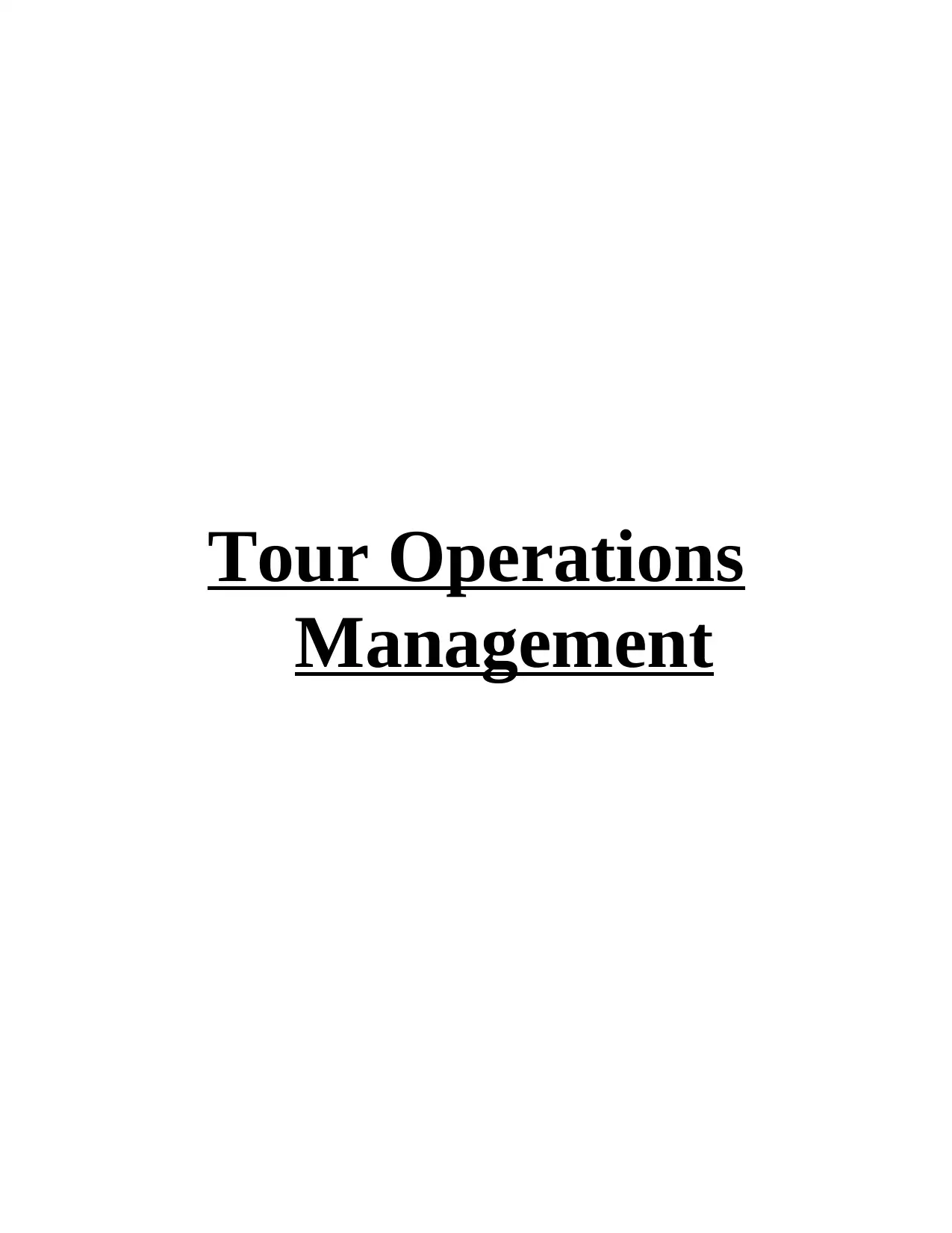
Tour Operations
Management
Management
Secure Best Marks with AI Grader
Need help grading? Try our AI Grader for instant feedback on your assignments.
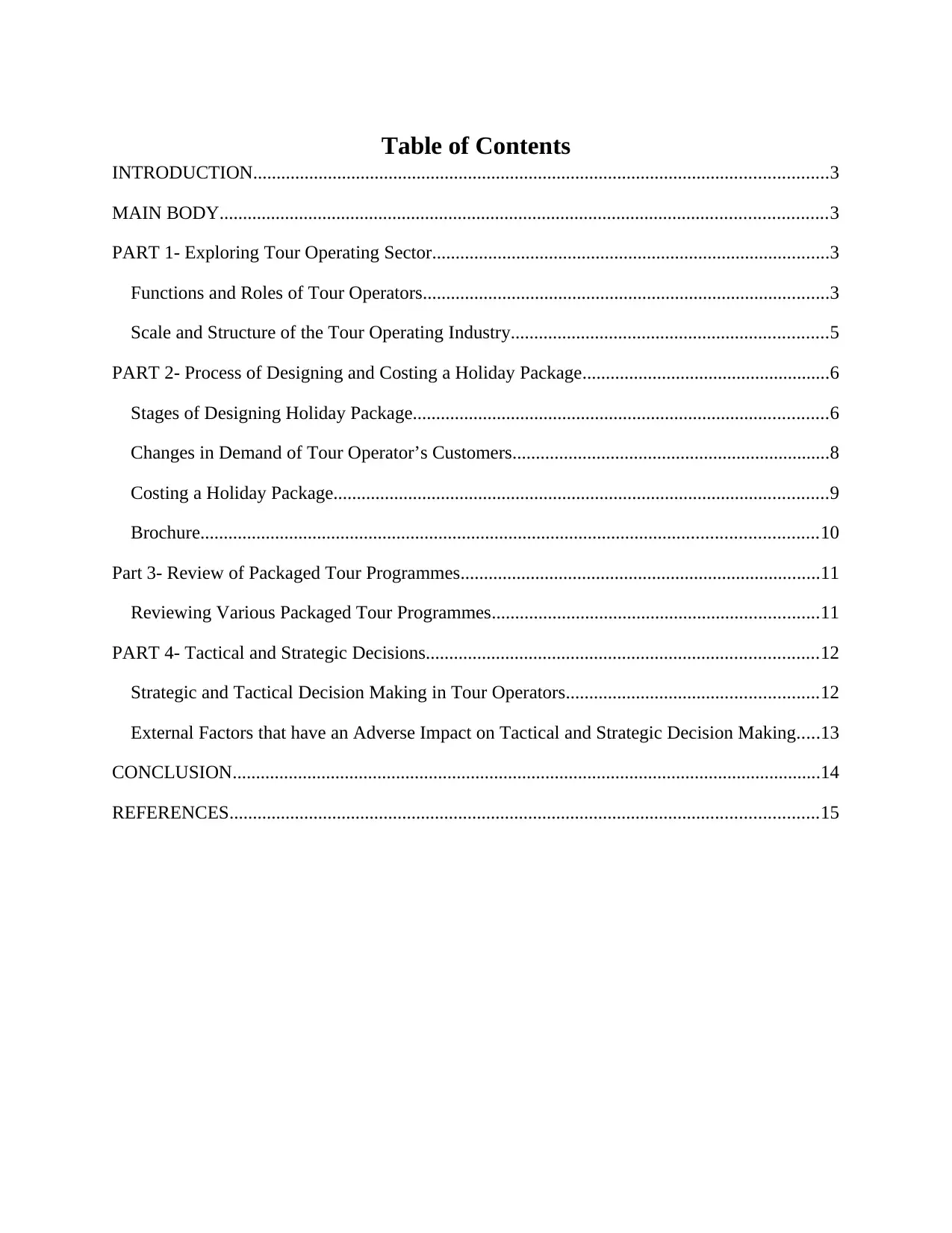
Table of Contents
INTRODUCTION...........................................................................................................................3
MAIN BODY..................................................................................................................................3
PART 1- Exploring Tour Operating Sector.....................................................................................3
Functions and Roles of Tour Operators.......................................................................................3
Scale and Structure of the Tour Operating Industry....................................................................5
PART 2- Process of Designing and Costing a Holiday Package.....................................................6
Stages of Designing Holiday Package.........................................................................................6
Changes in Demand of Tour Operator’s Customers....................................................................8
Costing a Holiday Package..........................................................................................................9
Brochure....................................................................................................................................10
Part 3- Review of Packaged Tour Programmes.............................................................................11
Reviewing Various Packaged Tour Programmes......................................................................11
PART 4- Tactical and Strategic Decisions....................................................................................12
Strategic and Tactical Decision Making in Tour Operators......................................................12
External Factors that have an Adverse Impact on Tactical and Strategic Decision Making.....13
CONCLUSION..............................................................................................................................14
REFERENCES..............................................................................................................................15
INTRODUCTION...........................................................................................................................3
MAIN BODY..................................................................................................................................3
PART 1- Exploring Tour Operating Sector.....................................................................................3
Functions and Roles of Tour Operators.......................................................................................3
Scale and Structure of the Tour Operating Industry....................................................................5
PART 2- Process of Designing and Costing a Holiday Package.....................................................6
Stages of Designing Holiday Package.........................................................................................6
Changes in Demand of Tour Operator’s Customers....................................................................8
Costing a Holiday Package..........................................................................................................9
Brochure....................................................................................................................................10
Part 3- Review of Packaged Tour Programmes.............................................................................11
Reviewing Various Packaged Tour Programmes......................................................................11
PART 4- Tactical and Strategic Decisions....................................................................................12
Strategic and Tactical Decision Making in Tour Operators......................................................12
External Factors that have an Adverse Impact on Tactical and Strategic Decision Making.....13
CONCLUSION..............................................................................................................................14
REFERENCES..............................................................................................................................15
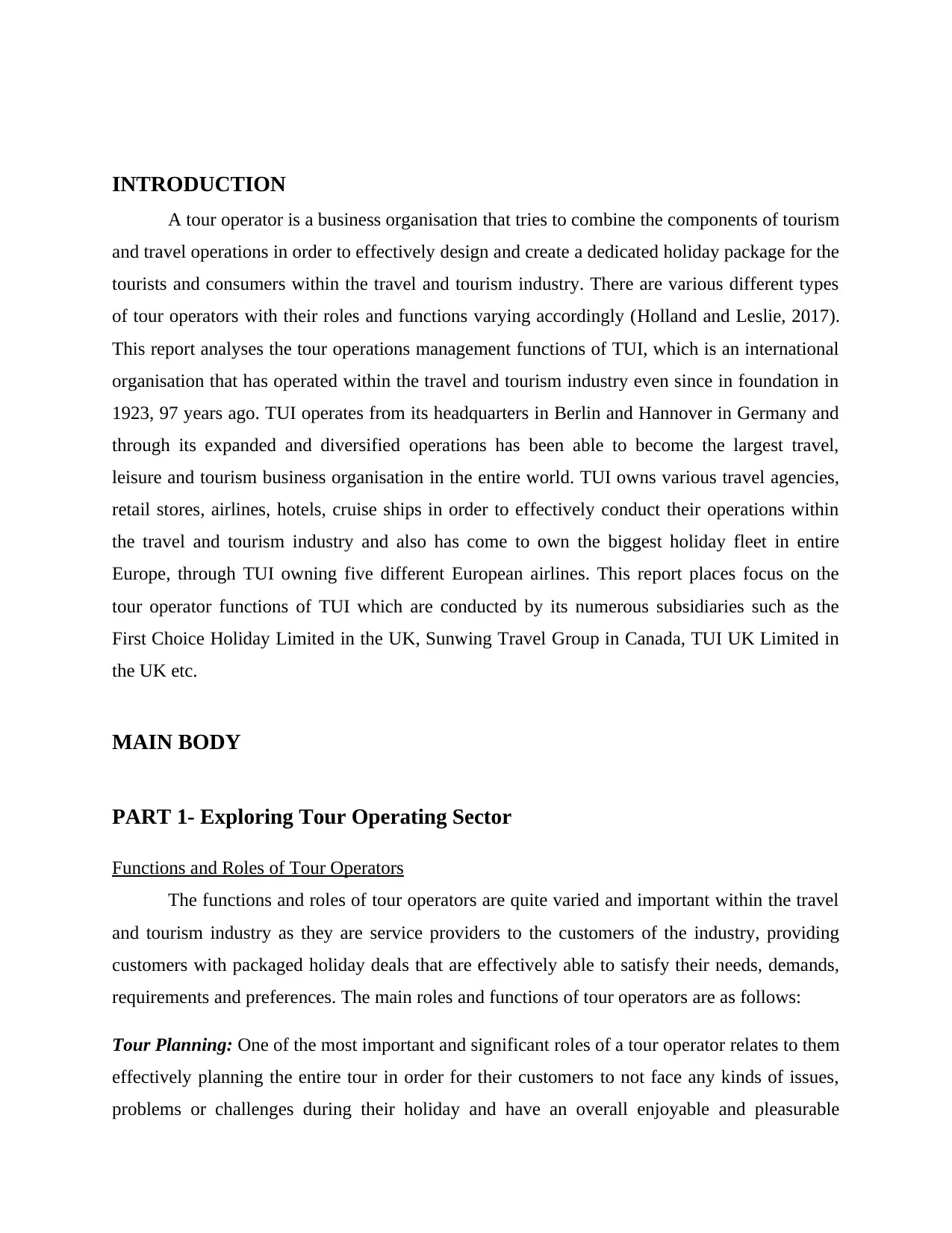
INTRODUCTION
A tour operator is a business organisation that tries to combine the components of tourism
and travel operations in order to effectively design and create a dedicated holiday package for the
tourists and consumers within the travel and tourism industry. There are various different types
of tour operators with their roles and functions varying accordingly (Holland and Leslie, 2017).
This report analyses the tour operations management functions of TUI, which is an international
organisation that has operated within the travel and tourism industry even since in foundation in
1923, 97 years ago. TUI operates from its headquarters in Berlin and Hannover in Germany and
through its expanded and diversified operations has been able to become the largest travel,
leisure and tourism business organisation in the entire world. TUI owns various travel agencies,
retail stores, airlines, hotels, cruise ships in order to effectively conduct their operations within
the travel and tourism industry and also has come to own the biggest holiday fleet in entire
Europe, through TUI owning five different European airlines. This report places focus on the
tour operator functions of TUI which are conducted by its numerous subsidiaries such as the
First Choice Holiday Limited in the UK, Sunwing Travel Group in Canada, TUI UK Limited in
the UK etc.
MAIN BODY
PART 1- Exploring Tour Operating Sector
Functions and Roles of Tour Operators
The functions and roles of tour operators are quite varied and important within the travel
and tourism industry as they are service providers to the customers of the industry, providing
customers with packaged holiday deals that are effectively able to satisfy their needs, demands,
requirements and preferences. The main roles and functions of tour operators are as follows:
Tour Planning: One of the most important and significant roles of a tour operator relates to them
effectively planning the entire tour in order for their customers to not face any kinds of issues,
problems or challenges during their holiday and have an overall enjoyable and pleasurable
A tour operator is a business organisation that tries to combine the components of tourism
and travel operations in order to effectively design and create a dedicated holiday package for the
tourists and consumers within the travel and tourism industry. There are various different types
of tour operators with their roles and functions varying accordingly (Holland and Leslie, 2017).
This report analyses the tour operations management functions of TUI, which is an international
organisation that has operated within the travel and tourism industry even since in foundation in
1923, 97 years ago. TUI operates from its headquarters in Berlin and Hannover in Germany and
through its expanded and diversified operations has been able to become the largest travel,
leisure and tourism business organisation in the entire world. TUI owns various travel agencies,
retail stores, airlines, hotels, cruise ships in order to effectively conduct their operations within
the travel and tourism industry and also has come to own the biggest holiday fleet in entire
Europe, through TUI owning five different European airlines. This report places focus on the
tour operator functions of TUI which are conducted by its numerous subsidiaries such as the
First Choice Holiday Limited in the UK, Sunwing Travel Group in Canada, TUI UK Limited in
the UK etc.
MAIN BODY
PART 1- Exploring Tour Operating Sector
Functions and Roles of Tour Operators
The functions and roles of tour operators are quite varied and important within the travel
and tourism industry as they are service providers to the customers of the industry, providing
customers with packaged holiday deals that are effectively able to satisfy their needs, demands,
requirements and preferences. The main roles and functions of tour operators are as follows:
Tour Planning: One of the most important and significant roles of a tour operator relates to them
effectively planning the entire tour in order for their customers to not face any kinds of issues,
problems or challenges during their holiday and have an overall enjoyable and pleasurable
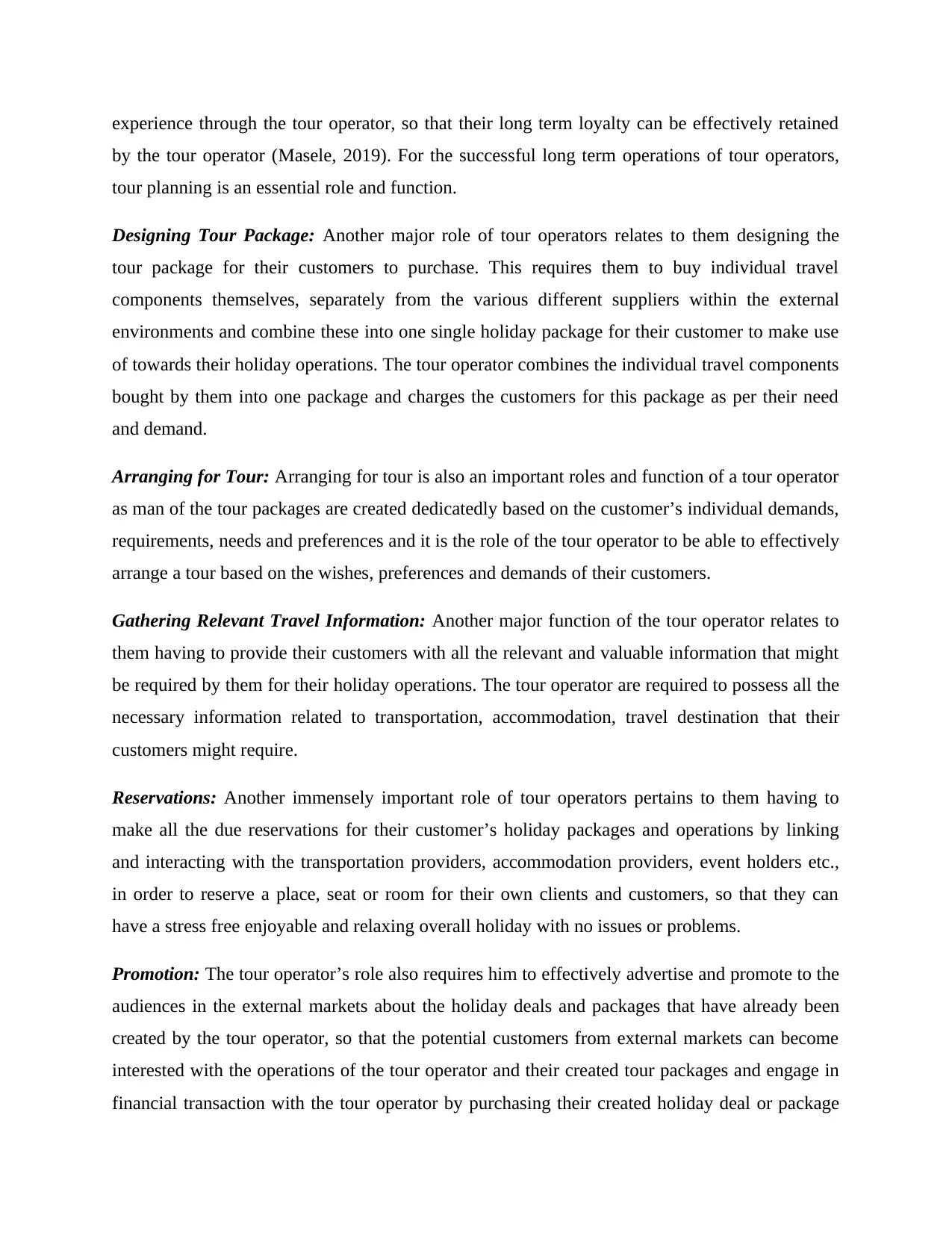
experience through the tour operator, so that their long term loyalty can be effectively retained
by the tour operator (Masele, 2019). For the successful long term operations of tour operators,
tour planning is an essential role and function.
Designing Tour Package: Another major role of tour operators relates to them designing the
tour package for their customers to purchase. This requires them to buy individual travel
components themselves, separately from the various different suppliers within the external
environments and combine these into one single holiday package for their customer to make use
of towards their holiday operations. The tour operator combines the individual travel components
bought by them into one package and charges the customers for this package as per their need
and demand.
Arranging for Tour: Arranging for tour is also an important roles and function of a tour operator
as man of the tour packages are created dedicatedly based on the customer’s individual demands,
requirements, needs and preferences and it is the role of the tour operator to be able to effectively
arrange a tour based on the wishes, preferences and demands of their customers.
Gathering Relevant Travel Information: Another major function of the tour operator relates to
them having to provide their customers with all the relevant and valuable information that might
be required by them for their holiday operations. The tour operator are required to possess all the
necessary information related to transportation, accommodation, travel destination that their
customers might require.
Reservations: Another immensely important role of tour operators pertains to them having to
make all the due reservations for their customer’s holiday packages and operations by linking
and interacting with the transportation providers, accommodation providers, event holders etc.,
in order to reserve a place, seat or room for their own clients and customers, so that they can
have a stress free enjoyable and relaxing overall holiday with no issues or problems.
Promotion: The tour operator’s role also requires him to effectively advertise and promote to the
audiences in the external markets about the holiday deals and packages that have already been
created by the tour operator, so that the potential customers from external markets can become
interested with the operations of the tour operator and their created tour packages and engage in
financial transaction with the tour operator by purchasing their created holiday deal or package
by the tour operator (Masele, 2019). For the successful long term operations of tour operators,
tour planning is an essential role and function.
Designing Tour Package: Another major role of tour operators relates to them designing the
tour package for their customers to purchase. This requires them to buy individual travel
components themselves, separately from the various different suppliers within the external
environments and combine these into one single holiday package for their customer to make use
of towards their holiday operations. The tour operator combines the individual travel components
bought by them into one package and charges the customers for this package as per their need
and demand.
Arranging for Tour: Arranging for tour is also an important roles and function of a tour operator
as man of the tour packages are created dedicatedly based on the customer’s individual demands,
requirements, needs and preferences and it is the role of the tour operator to be able to effectively
arrange a tour based on the wishes, preferences and demands of their customers.
Gathering Relevant Travel Information: Another major function of the tour operator relates to
them having to provide their customers with all the relevant and valuable information that might
be required by them for their holiday operations. The tour operator are required to possess all the
necessary information related to transportation, accommodation, travel destination that their
customers might require.
Reservations: Another immensely important role of tour operators pertains to them having to
make all the due reservations for their customer’s holiday packages and operations by linking
and interacting with the transportation providers, accommodation providers, event holders etc.,
in order to reserve a place, seat or room for their own clients and customers, so that they can
have a stress free enjoyable and relaxing overall holiday with no issues or problems.
Promotion: The tour operator’s role also requires him to effectively advertise and promote to the
audiences in the external markets about the holiday deals and packages that have already been
created by the tour operator, so that the potential customers from external markets can become
interested with the operations of the tour operator and their created tour packages and engage in
financial transaction with the tour operator by purchasing their created holiday deal or package
Secure Best Marks with AI Grader
Need help grading? Try our AI Grader for instant feedback on your assignments.
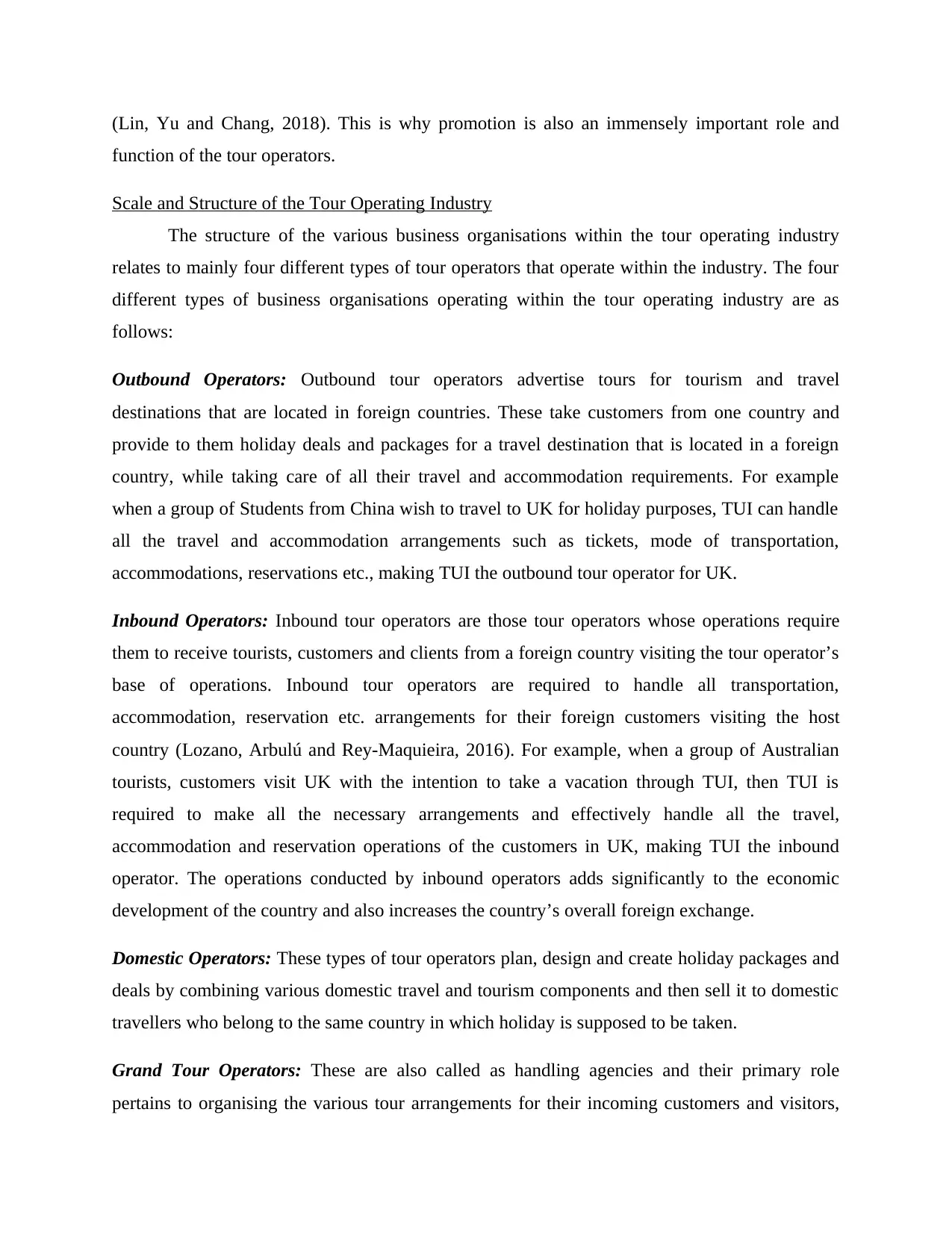
(Lin, Yu and Chang, 2018). This is why promotion is also an immensely important role and
function of the tour operators.
Scale and Structure of the Tour Operating Industry
The structure of the various business organisations within the tour operating industry
relates to mainly four different types of tour operators that operate within the industry. The four
different types of business organisations operating within the tour operating industry are as
follows:
Outbound Operators: Outbound tour operators advertise tours for tourism and travel
destinations that are located in foreign countries. These take customers from one country and
provide to them holiday deals and packages for a travel destination that is located in a foreign
country, while taking care of all their travel and accommodation requirements. For example
when a group of Students from China wish to travel to UK for holiday purposes, TUI can handle
all the travel and accommodation arrangements such as tickets, mode of transportation,
accommodations, reservations etc., making TUI the outbound tour operator for UK.
Inbound Operators: Inbound tour operators are those tour operators whose operations require
them to receive tourists, customers and clients from a foreign country visiting the tour operator’s
base of operations. Inbound tour operators are required to handle all transportation,
accommodation, reservation etc. arrangements for their foreign customers visiting the host
country (Lozano, Arbulú and Rey-Maquieira, 2016). For example, when a group of Australian
tourists, customers visit UK with the intention to take a vacation through TUI, then TUI is
required to make all the necessary arrangements and effectively handle all the travel,
accommodation and reservation operations of the customers in UK, making TUI the inbound
operator. The operations conducted by inbound operators adds significantly to the economic
development of the country and also increases the country’s overall foreign exchange.
Domestic Operators: These types of tour operators plan, design and create holiday packages and
deals by combining various domestic travel and tourism components and then sell it to domestic
travellers who belong to the same country in which holiday is supposed to be taken.
Grand Tour Operators: These are also called as handling agencies and their primary role
pertains to organising the various tour arrangements for their incoming customers and visitors,
function of the tour operators.
Scale and Structure of the Tour Operating Industry
The structure of the various business organisations within the tour operating industry
relates to mainly four different types of tour operators that operate within the industry. The four
different types of business organisations operating within the tour operating industry are as
follows:
Outbound Operators: Outbound tour operators advertise tours for tourism and travel
destinations that are located in foreign countries. These take customers from one country and
provide to them holiday deals and packages for a travel destination that is located in a foreign
country, while taking care of all their travel and accommodation requirements. For example
when a group of Students from China wish to travel to UK for holiday purposes, TUI can handle
all the travel and accommodation arrangements such as tickets, mode of transportation,
accommodations, reservations etc., making TUI the outbound tour operator for UK.
Inbound Operators: Inbound tour operators are those tour operators whose operations require
them to receive tourists, customers and clients from a foreign country visiting the tour operator’s
base of operations. Inbound tour operators are required to handle all transportation,
accommodation, reservation etc. arrangements for their foreign customers visiting the host
country (Lozano, Arbulú and Rey-Maquieira, 2016). For example, when a group of Australian
tourists, customers visit UK with the intention to take a vacation through TUI, then TUI is
required to make all the necessary arrangements and effectively handle all the travel,
accommodation and reservation operations of the customers in UK, making TUI the inbound
operator. The operations conducted by inbound operators adds significantly to the economic
development of the country and also increases the country’s overall foreign exchange.
Domestic Operators: These types of tour operators plan, design and create holiday packages and
deals by combining various domestic travel and tourism components and then sell it to domestic
travellers who belong to the same country in which holiday is supposed to be taken.
Grand Tour Operators: These are also called as handling agencies and their primary role
pertains to organising the various tour arrangements for their incoming customers and visitors,
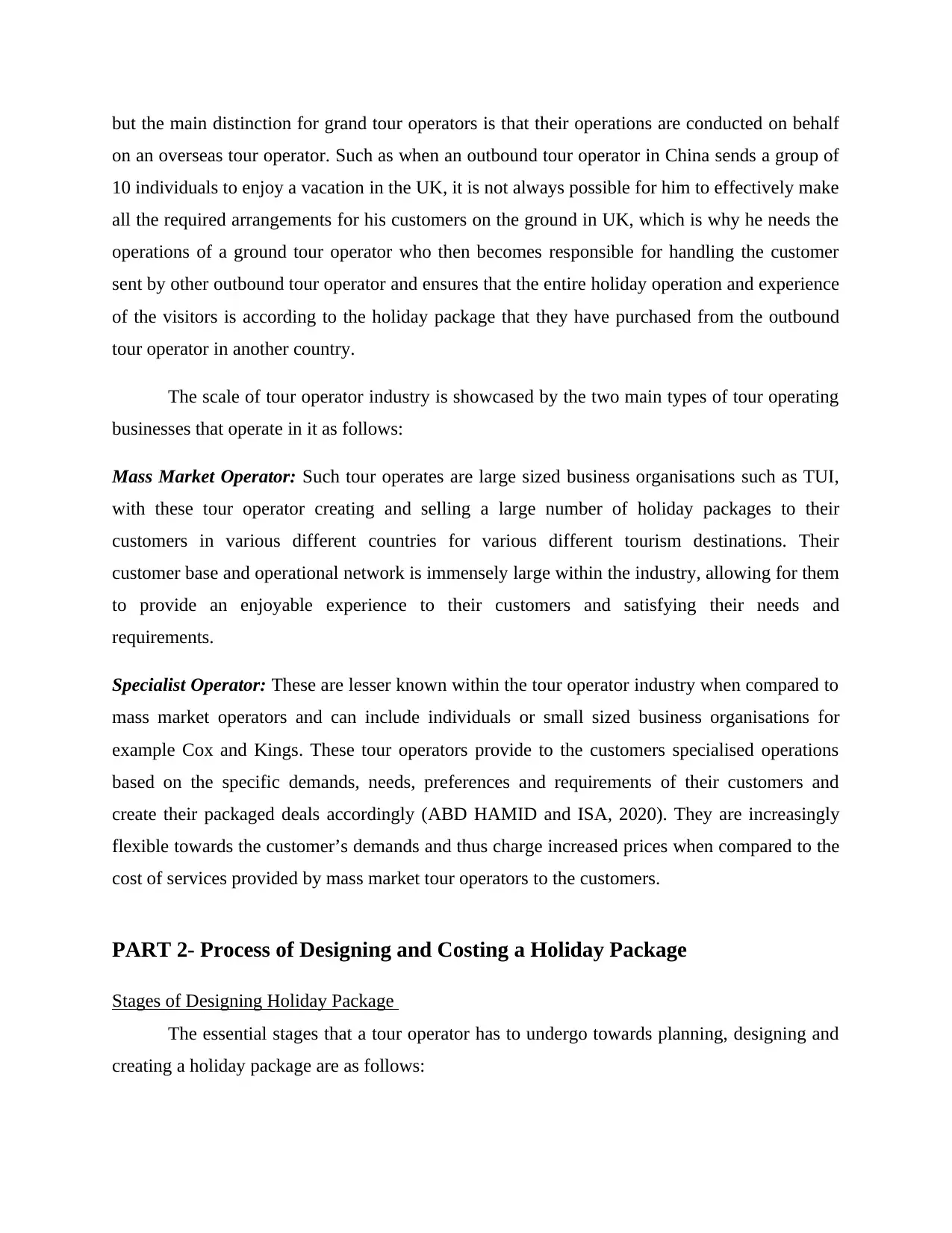
but the main distinction for grand tour operators is that their operations are conducted on behalf
on an overseas tour operator. Such as when an outbound tour operator in China sends a group of
10 individuals to enjoy a vacation in the UK, it is not always possible for him to effectively make
all the required arrangements for his customers on the ground in UK, which is why he needs the
operations of a ground tour operator who then becomes responsible for handling the customer
sent by other outbound tour operator and ensures that the entire holiday operation and experience
of the visitors is according to the holiday package that they have purchased from the outbound
tour operator in another country.
The scale of tour operator industry is showcased by the two main types of tour operating
businesses that operate in it as follows:
Mass Market Operator: Such tour operates are large sized business organisations such as TUI,
with these tour operator creating and selling a large number of holiday packages to their
customers in various different countries for various different tourism destinations. Their
customer base and operational network is immensely large within the industry, allowing for them
to provide an enjoyable experience to their customers and satisfying their needs and
requirements.
Specialist Operator: These are lesser known within the tour operator industry when compared to
mass market operators and can include individuals or small sized business organisations for
example Cox and Kings. These tour operators provide to the customers specialised operations
based on the specific demands, needs, preferences and requirements of their customers and
create their packaged deals accordingly (ABD HAMID and ISA, 2020). They are increasingly
flexible towards the customer’s demands and thus charge increased prices when compared to the
cost of services provided by mass market tour operators to the customers.
PART 2- Process of Designing and Costing a Holiday Package
Stages of Designing Holiday Package
The essential stages that a tour operator has to undergo towards planning, designing and
creating a holiday package are as follows:
on an overseas tour operator. Such as when an outbound tour operator in China sends a group of
10 individuals to enjoy a vacation in the UK, it is not always possible for him to effectively make
all the required arrangements for his customers on the ground in UK, which is why he needs the
operations of a ground tour operator who then becomes responsible for handling the customer
sent by other outbound tour operator and ensures that the entire holiday operation and experience
of the visitors is according to the holiday package that they have purchased from the outbound
tour operator in another country.
The scale of tour operator industry is showcased by the two main types of tour operating
businesses that operate in it as follows:
Mass Market Operator: Such tour operates are large sized business organisations such as TUI,
with these tour operator creating and selling a large number of holiday packages to their
customers in various different countries for various different tourism destinations. Their
customer base and operational network is immensely large within the industry, allowing for them
to provide an enjoyable experience to their customers and satisfying their needs and
requirements.
Specialist Operator: These are lesser known within the tour operator industry when compared to
mass market operators and can include individuals or small sized business organisations for
example Cox and Kings. These tour operators provide to the customers specialised operations
based on the specific demands, needs, preferences and requirements of their customers and
create their packaged deals accordingly (ABD HAMID and ISA, 2020). They are increasingly
flexible towards the customer’s demands and thus charge increased prices when compared to the
cost of services provided by mass market tour operators to the customers.
PART 2- Process of Designing and Costing a Holiday Package
Stages of Designing Holiday Package
The essential stages that a tour operator has to undergo towards planning, designing and
creating a holiday package are as follows:
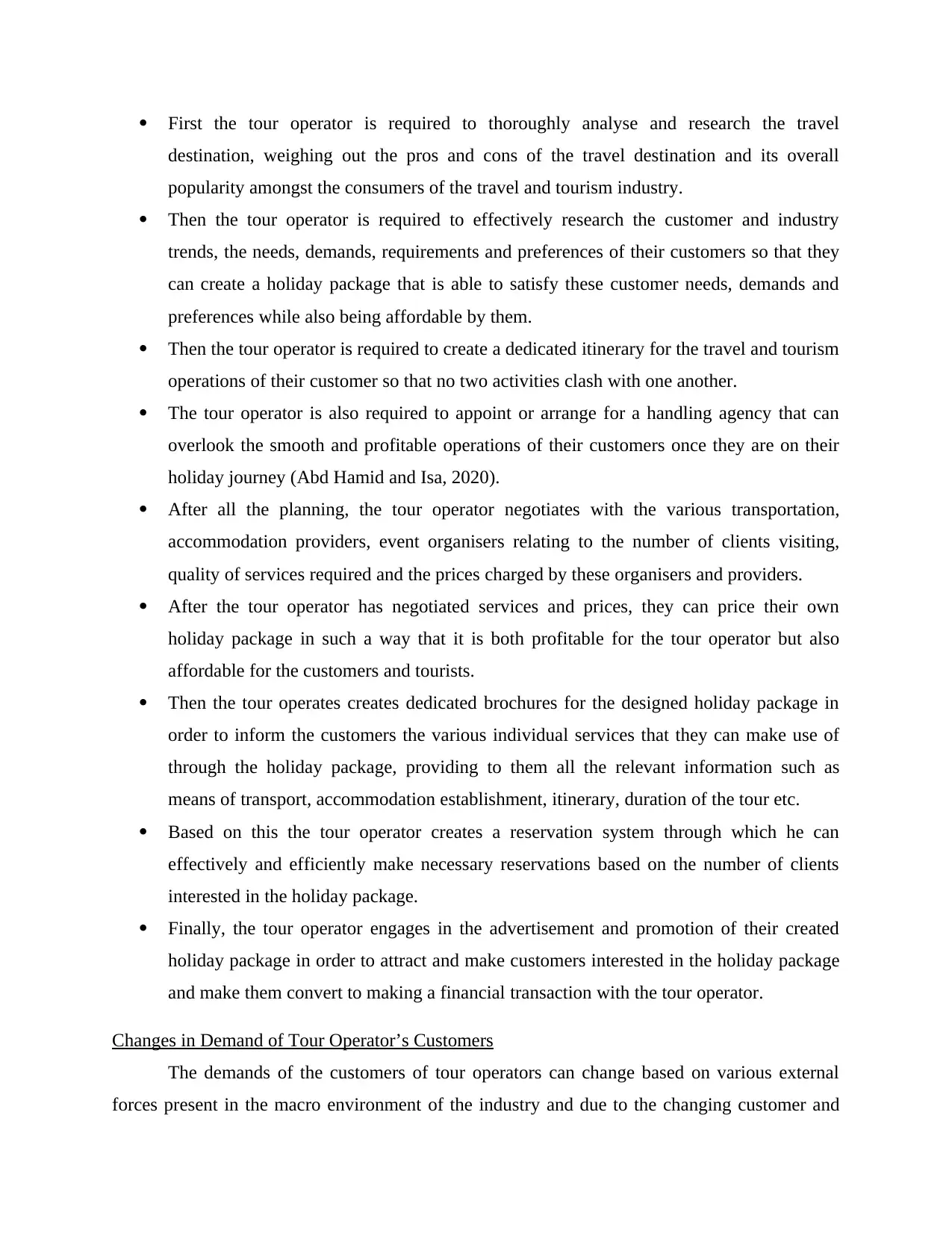
First the tour operator is required to thoroughly analyse and research the travel
destination, weighing out the pros and cons of the travel destination and its overall
popularity amongst the consumers of the travel and tourism industry.
Then the tour operator is required to effectively research the customer and industry
trends, the needs, demands, requirements and preferences of their customers so that they
can create a holiday package that is able to satisfy these customer needs, demands and
preferences while also being affordable by them.
Then the tour operator is required to create a dedicated itinerary for the travel and tourism
operations of their customer so that no two activities clash with one another.
The tour operator is also required to appoint or arrange for a handling agency that can
overlook the smooth and profitable operations of their customers once they are on their
holiday journey (Abd Hamid and Isa, 2020).
After all the planning, the tour operator negotiates with the various transportation,
accommodation providers, event organisers relating to the number of clients visiting,
quality of services required and the prices charged by these organisers and providers.
After the tour operator has negotiated services and prices, they can price their own
holiday package in such a way that it is both profitable for the tour operator but also
affordable for the customers and tourists.
Then the tour operates creates dedicated brochures for the designed holiday package in
order to inform the customers the various individual services that they can make use of
through the holiday package, providing to them all the relevant information such as
means of transport, accommodation establishment, itinerary, duration of the tour etc.
Based on this the tour operator creates a reservation system through which he can
effectively and efficiently make necessary reservations based on the number of clients
interested in the holiday package.
Finally, the tour operator engages in the advertisement and promotion of their created
holiday package in order to attract and make customers interested in the holiday package
and make them convert to making a financial transaction with the tour operator.
Changes in Demand of Tour Operator’s Customers
The demands of the customers of tour operators can change based on various external
forces present in the macro environment of the industry and due to the changing customer and
destination, weighing out the pros and cons of the travel destination and its overall
popularity amongst the consumers of the travel and tourism industry.
Then the tour operator is required to effectively research the customer and industry
trends, the needs, demands, requirements and preferences of their customers so that they
can create a holiday package that is able to satisfy these customer needs, demands and
preferences while also being affordable by them.
Then the tour operator is required to create a dedicated itinerary for the travel and tourism
operations of their customer so that no two activities clash with one another.
The tour operator is also required to appoint or arrange for a handling agency that can
overlook the smooth and profitable operations of their customers once they are on their
holiday journey (Abd Hamid and Isa, 2020).
After all the planning, the tour operator negotiates with the various transportation,
accommodation providers, event organisers relating to the number of clients visiting,
quality of services required and the prices charged by these organisers and providers.
After the tour operator has negotiated services and prices, they can price their own
holiday package in such a way that it is both profitable for the tour operator but also
affordable for the customers and tourists.
Then the tour operates creates dedicated brochures for the designed holiday package in
order to inform the customers the various individual services that they can make use of
through the holiday package, providing to them all the relevant information such as
means of transport, accommodation establishment, itinerary, duration of the tour etc.
Based on this the tour operator creates a reservation system through which he can
effectively and efficiently make necessary reservations based on the number of clients
interested in the holiday package.
Finally, the tour operator engages in the advertisement and promotion of their created
holiday package in order to attract and make customers interested in the holiday package
and make them convert to making a financial transaction with the tour operator.
Changes in Demand of Tour Operator’s Customers
The demands of the customers of tour operators can change based on various external
forces present in the macro environment of the industry and due to the changing customer and
Paraphrase This Document
Need a fresh take? Get an instant paraphrase of this document with our AI Paraphraser
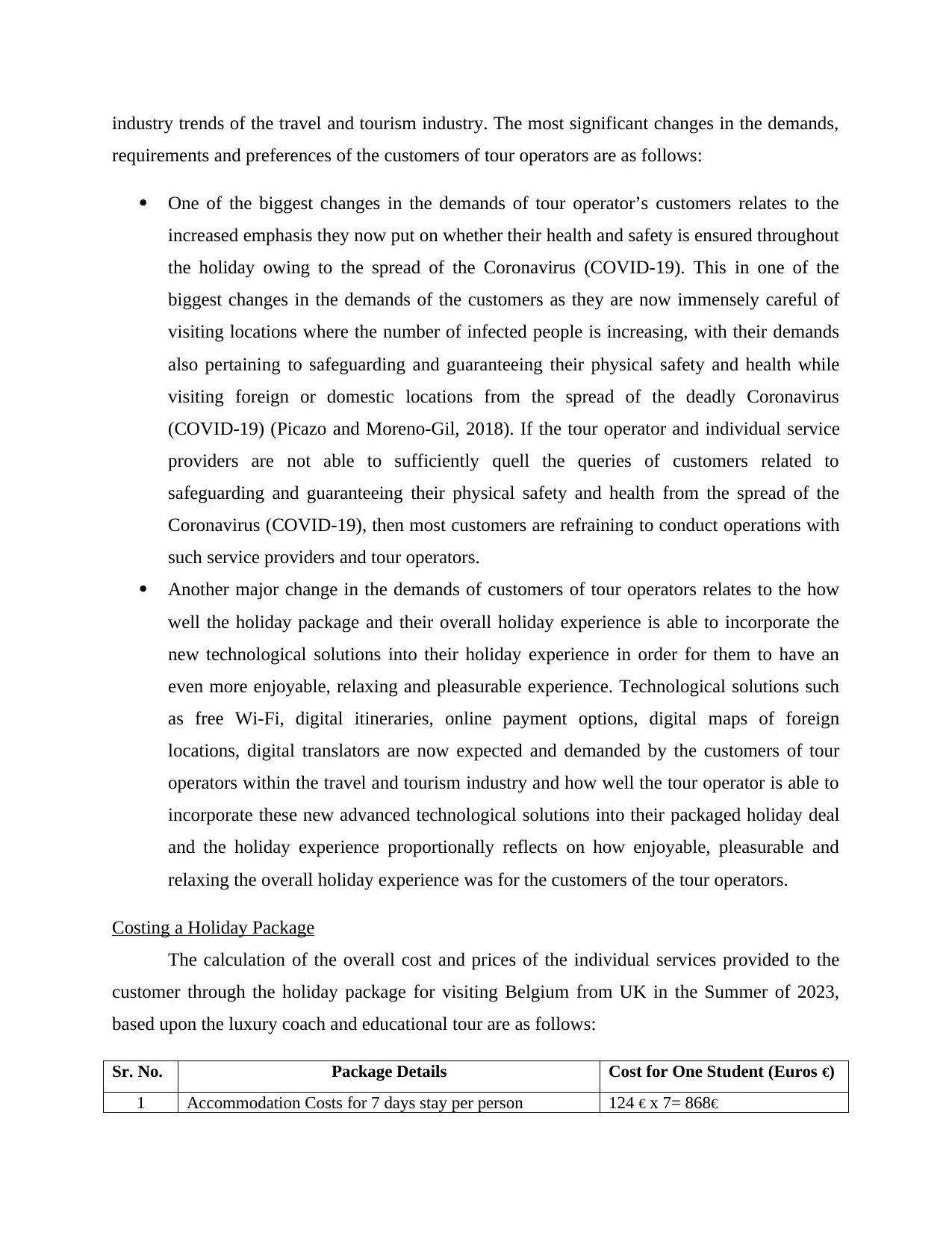
industry trends of the travel and tourism industry. The most significant changes in the demands,
requirements and preferences of the customers of tour operators are as follows:
One of the biggest changes in the demands of tour operator’s customers relates to the
increased emphasis they now put on whether their health and safety is ensured throughout
the holiday owing to the spread of the Coronavirus (COVID-19). This in one of the
biggest changes in the demands of the customers as they are now immensely careful of
visiting locations where the number of infected people is increasing, with their demands
also pertaining to safeguarding and guaranteeing their physical safety and health while
visiting foreign or domestic locations from the spread of the deadly Coronavirus
(COVID-19) (Picazo and Moreno-Gil, 2018). If the tour operator and individual service
providers are not able to sufficiently quell the queries of customers related to
safeguarding and guaranteeing their physical safety and health from the spread of the
Coronavirus (COVID-19), then most customers are refraining to conduct operations with
such service providers and tour operators.
Another major change in the demands of customers of tour operators relates to the how
well the holiday package and their overall holiday experience is able to incorporate the
new technological solutions into their holiday experience in order for them to have an
even more enjoyable, relaxing and pleasurable experience. Technological solutions such
as free Wi-Fi, digital itineraries, online payment options, digital maps of foreign
locations, digital translators are now expected and demanded by the customers of tour
operators within the travel and tourism industry and how well the tour operator is able to
incorporate these new advanced technological solutions into their packaged holiday deal
and the holiday experience proportionally reflects on how enjoyable, pleasurable and
relaxing the overall holiday experience was for the customers of the tour operators.
Costing a Holiday Package
The calculation of the overall cost and prices of the individual services provided to the
customer through the holiday package for visiting Belgium from UK in the Summer of 2023,
based upon the luxury coach and educational tour are as follows:
Sr. No. Package Details Cost for One Student (Euros €)
1 Accommodation Costs for 7 days stay per person 124 € x 7= 868€
requirements and preferences of the customers of tour operators are as follows:
One of the biggest changes in the demands of tour operator’s customers relates to the
increased emphasis they now put on whether their health and safety is ensured throughout
the holiday owing to the spread of the Coronavirus (COVID-19). This in one of the
biggest changes in the demands of the customers as they are now immensely careful of
visiting locations where the number of infected people is increasing, with their demands
also pertaining to safeguarding and guaranteeing their physical safety and health while
visiting foreign or domestic locations from the spread of the deadly Coronavirus
(COVID-19) (Picazo and Moreno-Gil, 2018). If the tour operator and individual service
providers are not able to sufficiently quell the queries of customers related to
safeguarding and guaranteeing their physical safety and health from the spread of the
Coronavirus (COVID-19), then most customers are refraining to conduct operations with
such service providers and tour operators.
Another major change in the demands of customers of tour operators relates to the how
well the holiday package and their overall holiday experience is able to incorporate the
new technological solutions into their holiday experience in order for them to have an
even more enjoyable, relaxing and pleasurable experience. Technological solutions such
as free Wi-Fi, digital itineraries, online payment options, digital maps of foreign
locations, digital translators are now expected and demanded by the customers of tour
operators within the travel and tourism industry and how well the tour operator is able to
incorporate these new advanced technological solutions into their packaged holiday deal
and the holiday experience proportionally reflects on how enjoyable, pleasurable and
relaxing the overall holiday experience was for the customers of the tour operators.
Costing a Holiday Package
The calculation of the overall cost and prices of the individual services provided to the
customer through the holiday package for visiting Belgium from UK in the Summer of 2023,
based upon the luxury coach and educational tour are as follows:
Sr. No. Package Details Cost for One Student (Euros €)
1 Accommodation Costs for 7 days stay per person 124 € x 7= 868€
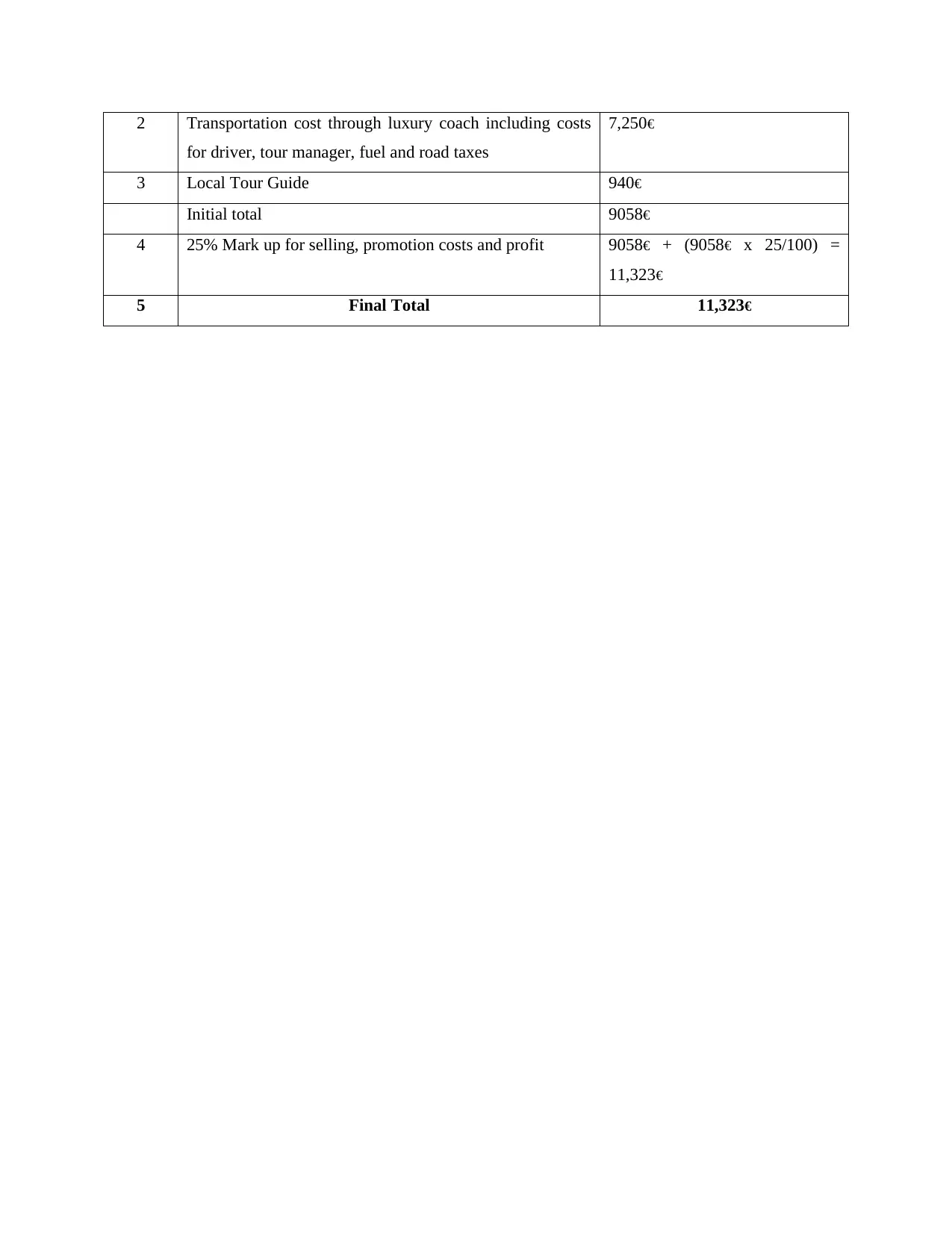
2 Transportation cost through luxury coach including costs
for driver, tour manager, fuel and road taxes
7,250€
3 Local Tour Guide 940€
Initial total 9058€
4 25% Mark up for selling, promotion costs and profit 9058€ + (9058€ x 25/100) =
11,323€
5 Final Total 11,323€
for driver, tour manager, fuel and road taxes
7,250€
3 Local Tour Guide 940€
Initial total 9058€
4 25% Mark up for selling, promotion costs and profit 9058€ + (9058€ x 25/100) =
11,323€
5 Final Total 11,323€
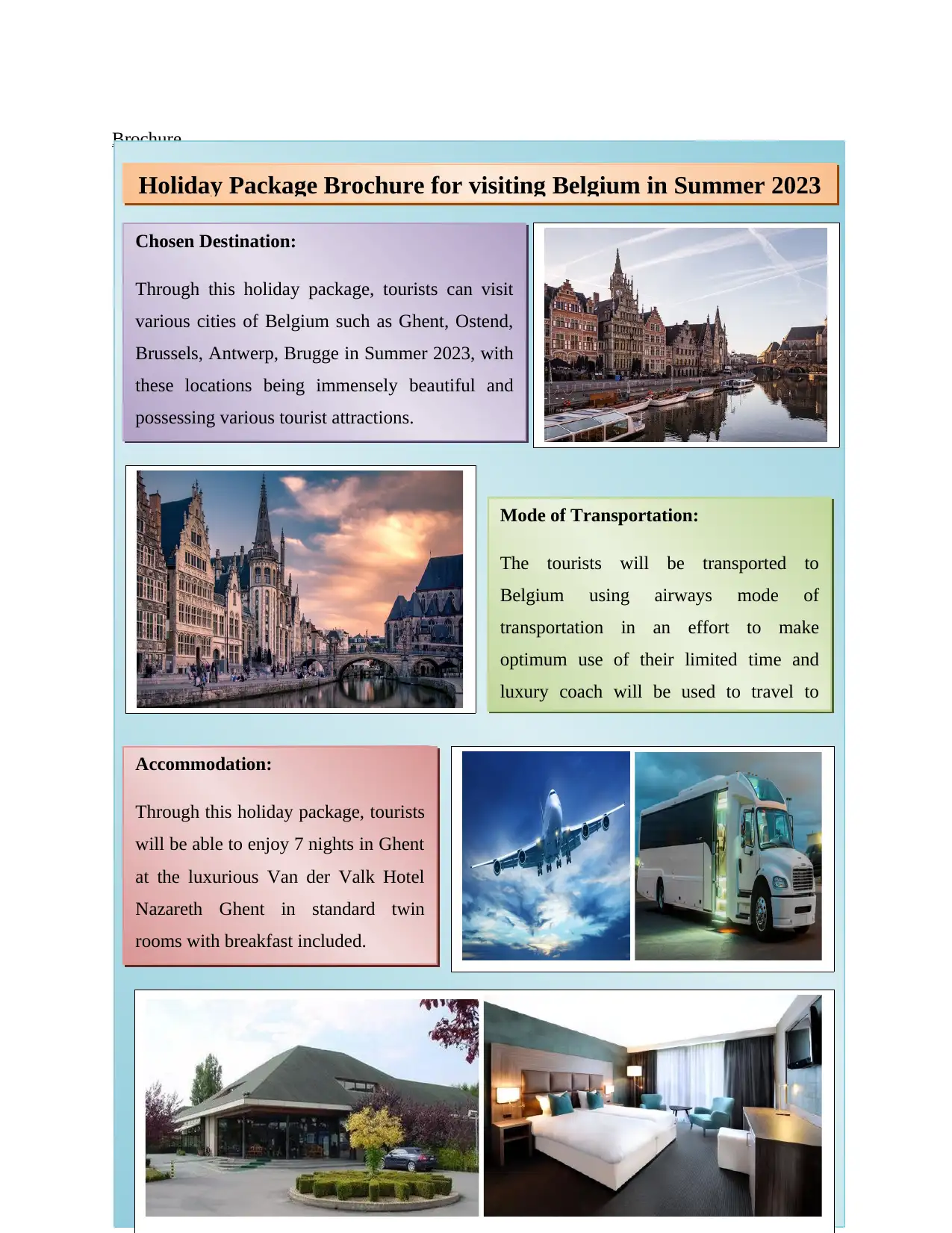
Brochure
Holiday Package Brochure for visiting Belgium in Summer 2023
Chosen Destination:
Through this holiday package, tourists can visit
various cities of Belgium such as Ghent, Ostend,
Brussels, Antwerp, Brugge in Summer 2023, with
these locations being immensely beautiful and
possessing various tourist attractions.
Mode of Transportation:
The tourists will be transported to
Belgium using airways mode of
transportation in an effort to make
optimum use of their limited time and
luxury coach will be used to travel to
various cities of Belgium
Accommodation:
Through this holiday package, tourists
will be able to enjoy 7 nights in Ghent
at the luxurious Van der Valk Hotel
Nazareth Ghent in standard twin
rooms with breakfast included.
Holiday Package Brochure for visiting Belgium in Summer 2023
Chosen Destination:
Through this holiday package, tourists can visit
various cities of Belgium such as Ghent, Ostend,
Brussels, Antwerp, Brugge in Summer 2023, with
these locations being immensely beautiful and
possessing various tourist attractions.
Mode of Transportation:
The tourists will be transported to
Belgium using airways mode of
transportation in an effort to make
optimum use of their limited time and
luxury coach will be used to travel to
various cities of Belgium
Accommodation:
Through this holiday package, tourists
will be able to enjoy 7 nights in Ghent
at the luxurious Van der Valk Hotel
Nazareth Ghent in standard twin
rooms with breakfast included.
Secure Best Marks with AI Grader
Need help grading? Try our AI Grader for instant feedback on your assignments.
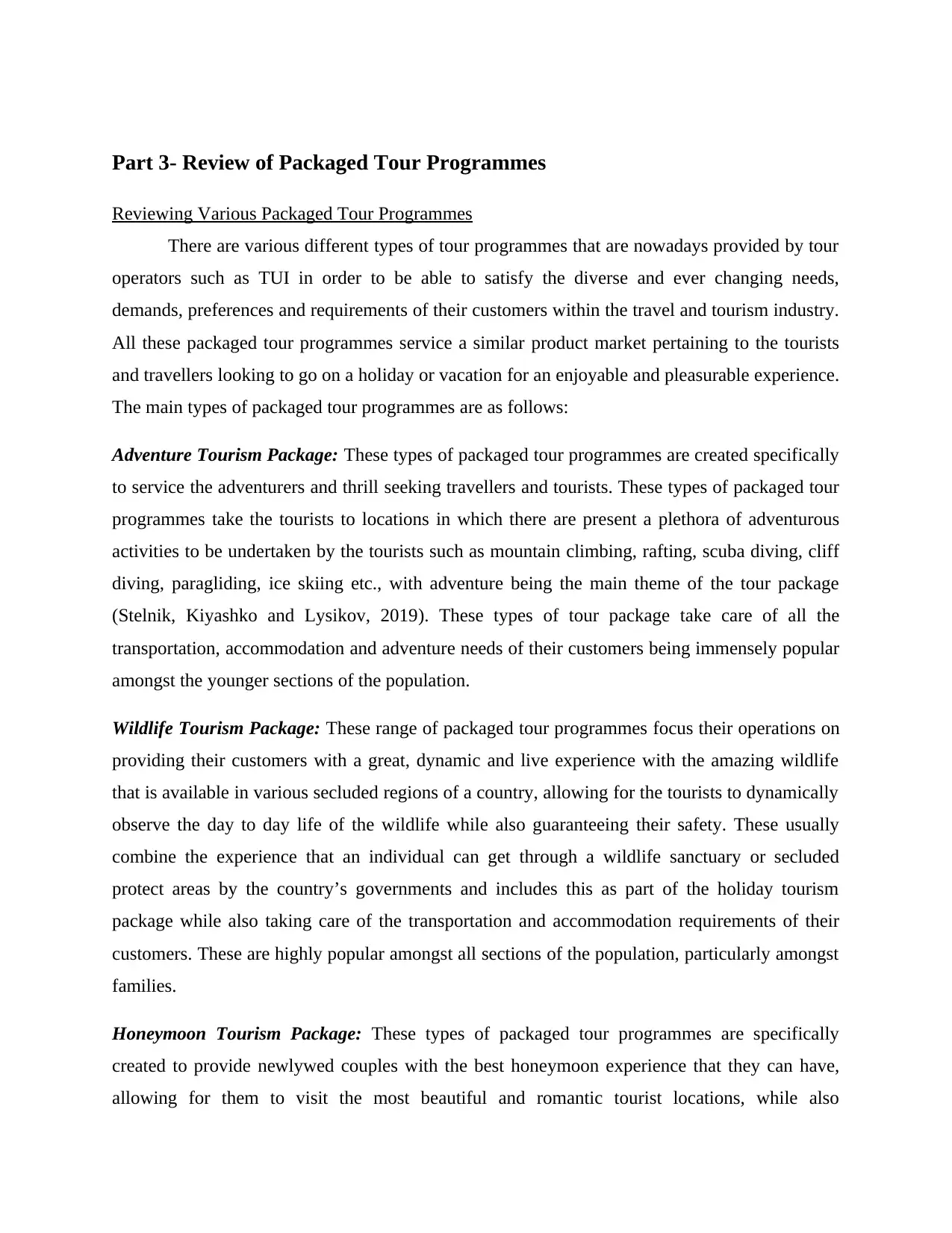
Part 3- Review of Packaged Tour Programmes
Reviewing Various Packaged Tour Programmes
There are various different types of tour programmes that are nowadays provided by tour
operators such as TUI in order to be able to satisfy the diverse and ever changing needs,
demands, preferences and requirements of their customers within the travel and tourism industry.
All these packaged tour programmes service a similar product market pertaining to the tourists
and travellers looking to go on a holiday or vacation for an enjoyable and pleasurable experience.
The main types of packaged tour programmes are as follows:
Adventure Tourism Package: These types of packaged tour programmes are created specifically
to service the adventurers and thrill seeking travellers and tourists. These types of packaged tour
programmes take the tourists to locations in which there are present a plethora of adventurous
activities to be undertaken by the tourists such as mountain climbing, rafting, scuba diving, cliff
diving, paragliding, ice skiing etc., with adventure being the main theme of the tour package
(Stelnik, Kiyashko and Lysikov, 2019). These types of tour package take care of all the
transportation, accommodation and adventure needs of their customers being immensely popular
amongst the younger sections of the population.
Wildlife Tourism Package: These range of packaged tour programmes focus their operations on
providing their customers with a great, dynamic and live experience with the amazing wildlife
that is available in various secluded regions of a country, allowing for the tourists to dynamically
observe the day to day life of the wildlife while also guaranteeing their safety. These usually
combine the experience that an individual can get through a wildlife sanctuary or secluded
protect areas by the country’s governments and includes this as part of the holiday tourism
package while also taking care of the transportation and accommodation requirements of their
customers. These are highly popular amongst all sections of the population, particularly amongst
families.
Honeymoon Tourism Package: These types of packaged tour programmes are specifically
created to provide newlywed couples with the best honeymoon experience that they can have,
allowing for them to visit the most beautiful and romantic tourist locations, while also
Reviewing Various Packaged Tour Programmes
There are various different types of tour programmes that are nowadays provided by tour
operators such as TUI in order to be able to satisfy the diverse and ever changing needs,
demands, preferences and requirements of their customers within the travel and tourism industry.
All these packaged tour programmes service a similar product market pertaining to the tourists
and travellers looking to go on a holiday or vacation for an enjoyable and pleasurable experience.
The main types of packaged tour programmes are as follows:
Adventure Tourism Package: These types of packaged tour programmes are created specifically
to service the adventurers and thrill seeking travellers and tourists. These types of packaged tour
programmes take the tourists to locations in which there are present a plethora of adventurous
activities to be undertaken by the tourists such as mountain climbing, rafting, scuba diving, cliff
diving, paragliding, ice skiing etc., with adventure being the main theme of the tour package
(Stelnik, Kiyashko and Lysikov, 2019). These types of tour package take care of all the
transportation, accommodation and adventure needs of their customers being immensely popular
amongst the younger sections of the population.
Wildlife Tourism Package: These range of packaged tour programmes focus their operations on
providing their customers with a great, dynamic and live experience with the amazing wildlife
that is available in various secluded regions of a country, allowing for the tourists to dynamically
observe the day to day life of the wildlife while also guaranteeing their safety. These usually
combine the experience that an individual can get through a wildlife sanctuary or secluded
protect areas by the country’s governments and includes this as part of the holiday tourism
package while also taking care of the transportation and accommodation requirements of their
customers. These are highly popular amongst all sections of the population, particularly amongst
families.
Honeymoon Tourism Package: These types of packaged tour programmes are specifically
created to provide newlywed couples with the best honeymoon experience that they can have,
allowing for them to visit the most beautiful and romantic tourist locations, while also
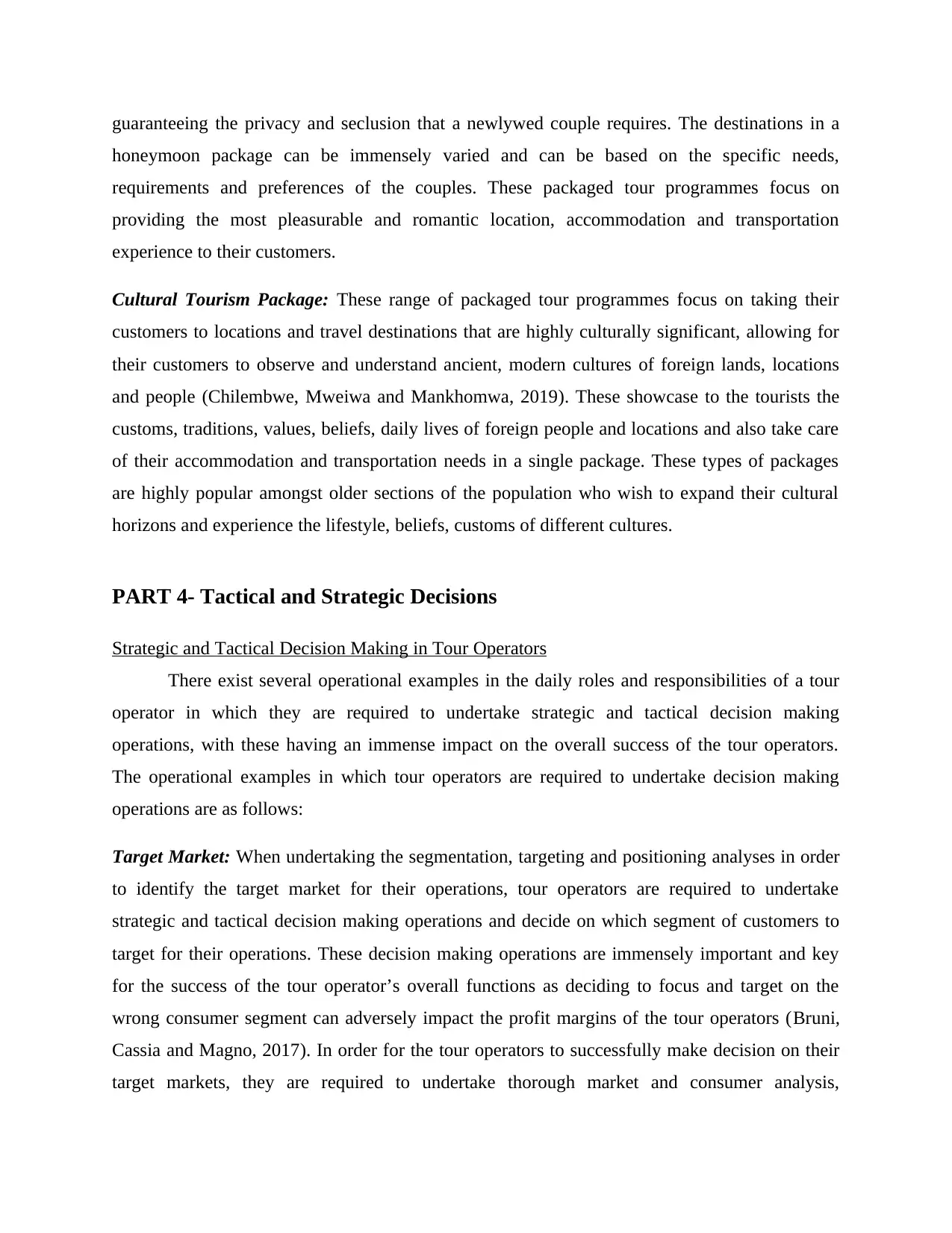
guaranteeing the privacy and seclusion that a newlywed couple requires. The destinations in a
honeymoon package can be immensely varied and can be based on the specific needs,
requirements and preferences of the couples. These packaged tour programmes focus on
providing the most pleasurable and romantic location, accommodation and transportation
experience to their customers.
Cultural Tourism Package: These range of packaged tour programmes focus on taking their
customers to locations and travel destinations that are highly culturally significant, allowing for
their customers to observe and understand ancient, modern cultures of foreign lands, locations
and people (Chilembwe, Mweiwa and Mankhomwa, 2019). These showcase to the tourists the
customs, traditions, values, beliefs, daily lives of foreign people and locations and also take care
of their accommodation and transportation needs in a single package. These types of packages
are highly popular amongst older sections of the population who wish to expand their cultural
horizons and experience the lifestyle, beliefs, customs of different cultures.
PART 4- Tactical and Strategic Decisions
Strategic and Tactical Decision Making in Tour Operators
There exist several operational examples in the daily roles and responsibilities of a tour
operator in which they are required to undertake strategic and tactical decision making
operations, with these having an immense impact on the overall success of the tour operators.
The operational examples in which tour operators are required to undertake decision making
operations are as follows:
Target Market: When undertaking the segmentation, targeting and positioning analyses in order
to identify the target market for their operations, tour operators are required to undertake
strategic and tactical decision making operations and decide on which segment of customers to
target for their operations. These decision making operations are immensely important and key
for the success of the tour operator’s overall functions as deciding to focus and target on the
wrong consumer segment can adversely impact the profit margins of the tour operators (Bruni,
Cassia and Magno, 2017). In order for the tour operators to successfully make decision on their
target markets, they are required to undertake thorough market and consumer analysis,
honeymoon package can be immensely varied and can be based on the specific needs,
requirements and preferences of the couples. These packaged tour programmes focus on
providing the most pleasurable and romantic location, accommodation and transportation
experience to their customers.
Cultural Tourism Package: These range of packaged tour programmes focus on taking their
customers to locations and travel destinations that are highly culturally significant, allowing for
their customers to observe and understand ancient, modern cultures of foreign lands, locations
and people (Chilembwe, Mweiwa and Mankhomwa, 2019). These showcase to the tourists the
customs, traditions, values, beliefs, daily lives of foreign people and locations and also take care
of their accommodation and transportation needs in a single package. These types of packages
are highly popular amongst older sections of the population who wish to expand their cultural
horizons and experience the lifestyle, beliefs, customs of different cultures.
PART 4- Tactical and Strategic Decisions
Strategic and Tactical Decision Making in Tour Operators
There exist several operational examples in the daily roles and responsibilities of a tour
operator in which they are required to undertake strategic and tactical decision making
operations, with these having an immense impact on the overall success of the tour operators.
The operational examples in which tour operators are required to undertake decision making
operations are as follows:
Target Market: When undertaking the segmentation, targeting and positioning analyses in order
to identify the target market for their operations, tour operators are required to undertake
strategic and tactical decision making operations and decide on which segment of customers to
target for their operations. These decision making operations are immensely important and key
for the success of the tour operator’s overall functions as deciding to focus and target on the
wrong consumer segment can adversely impact the profit margins of the tour operators (Bruni,
Cassia and Magno, 2017). In order for the tour operators to successfully make decision on their
target markets, they are required to undertake thorough market and consumer analysis,
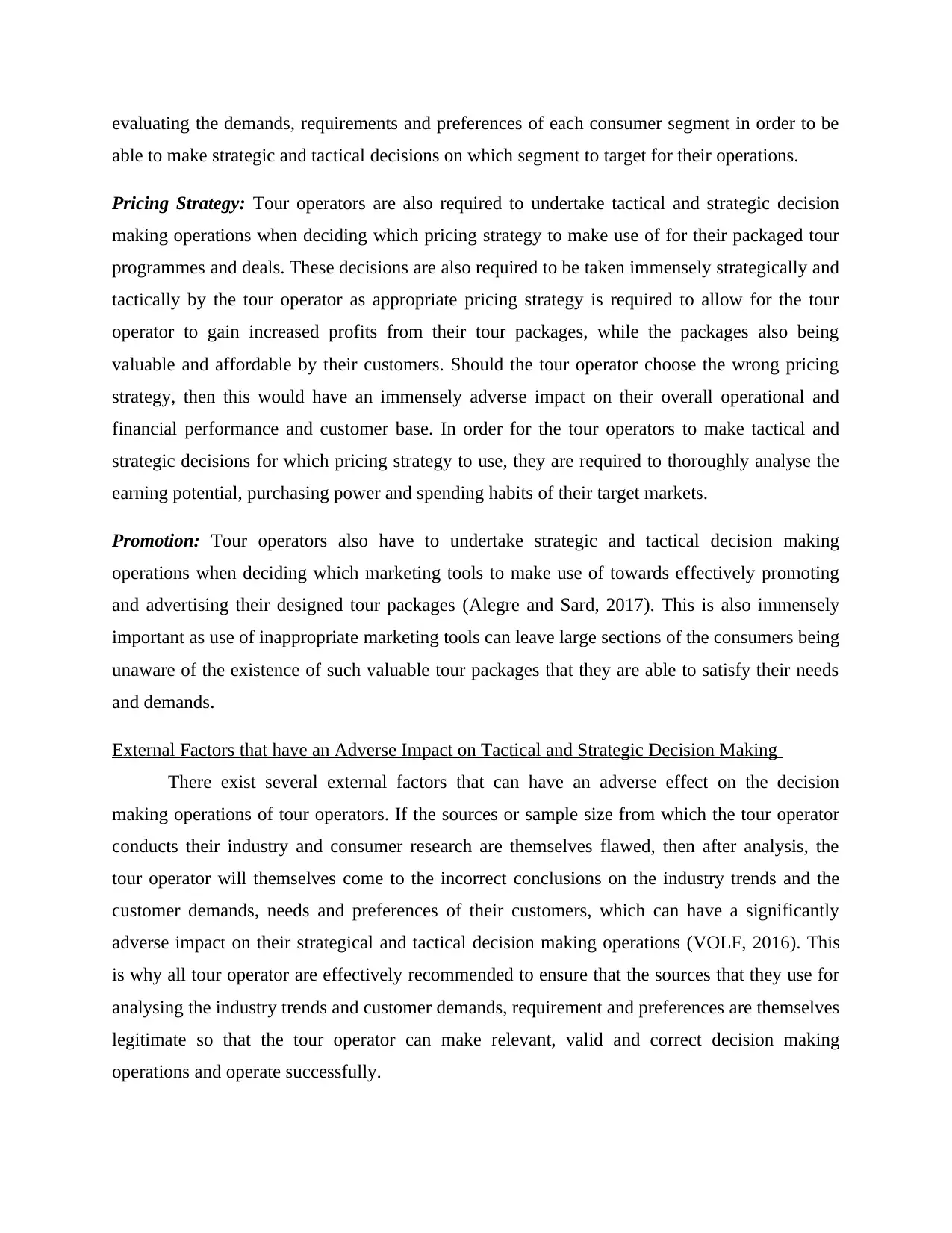
evaluating the demands, requirements and preferences of each consumer segment in order to be
able to make strategic and tactical decisions on which segment to target for their operations.
Pricing Strategy: Tour operators are also required to undertake tactical and strategic decision
making operations when deciding which pricing strategy to make use of for their packaged tour
programmes and deals. These decisions are also required to be taken immensely strategically and
tactically by the tour operator as appropriate pricing strategy is required to allow for the tour
operator to gain increased profits from their tour packages, while the packages also being
valuable and affordable by their customers. Should the tour operator choose the wrong pricing
strategy, then this would have an immensely adverse impact on their overall operational and
financial performance and customer base. In order for the tour operators to make tactical and
strategic decisions for which pricing strategy to use, they are required to thoroughly analyse the
earning potential, purchasing power and spending habits of their target markets.
Promotion: Tour operators also have to undertake strategic and tactical decision making
operations when deciding which marketing tools to make use of towards effectively promoting
and advertising their designed tour packages (Alegre and Sard, 2017). This is also immensely
important as use of inappropriate marketing tools can leave large sections of the consumers being
unaware of the existence of such valuable tour packages that they are able to satisfy their needs
and demands.
External Factors that have an Adverse Impact on Tactical and Strategic Decision Making
There exist several external factors that can have an adverse effect on the decision
making operations of tour operators. If the sources or sample size from which the tour operator
conducts their industry and consumer research are themselves flawed, then after analysis, the
tour operator will themselves come to the incorrect conclusions on the industry trends and the
customer demands, needs and preferences of their customers, which can have a significantly
adverse impact on their strategical and tactical decision making operations (VOLF, 2016). This
is why all tour operator are effectively recommended to ensure that the sources that they use for
analysing the industry trends and customer demands, requirement and preferences are themselves
legitimate so that the tour operator can make relevant, valid and correct decision making
operations and operate successfully.
able to make strategic and tactical decisions on which segment to target for their operations.
Pricing Strategy: Tour operators are also required to undertake tactical and strategic decision
making operations when deciding which pricing strategy to make use of for their packaged tour
programmes and deals. These decisions are also required to be taken immensely strategically and
tactically by the tour operator as appropriate pricing strategy is required to allow for the tour
operator to gain increased profits from their tour packages, while the packages also being
valuable and affordable by their customers. Should the tour operator choose the wrong pricing
strategy, then this would have an immensely adverse impact on their overall operational and
financial performance and customer base. In order for the tour operators to make tactical and
strategic decisions for which pricing strategy to use, they are required to thoroughly analyse the
earning potential, purchasing power and spending habits of their target markets.
Promotion: Tour operators also have to undertake strategic and tactical decision making
operations when deciding which marketing tools to make use of towards effectively promoting
and advertising their designed tour packages (Alegre and Sard, 2017). This is also immensely
important as use of inappropriate marketing tools can leave large sections of the consumers being
unaware of the existence of such valuable tour packages that they are able to satisfy their needs
and demands.
External Factors that have an Adverse Impact on Tactical and Strategic Decision Making
There exist several external factors that can have an adverse effect on the decision
making operations of tour operators. If the sources or sample size from which the tour operator
conducts their industry and consumer research are themselves flawed, then after analysis, the
tour operator will themselves come to the incorrect conclusions on the industry trends and the
customer demands, needs and preferences of their customers, which can have a significantly
adverse impact on their strategical and tactical decision making operations (VOLF, 2016). This
is why all tour operator are effectively recommended to ensure that the sources that they use for
analysing the industry trends and customer demands, requirement and preferences are themselves
legitimate so that the tour operator can make relevant, valid and correct decision making
operations and operate successfully.
Paraphrase This Document
Need a fresh take? Get an instant paraphrase of this document with our AI Paraphraser
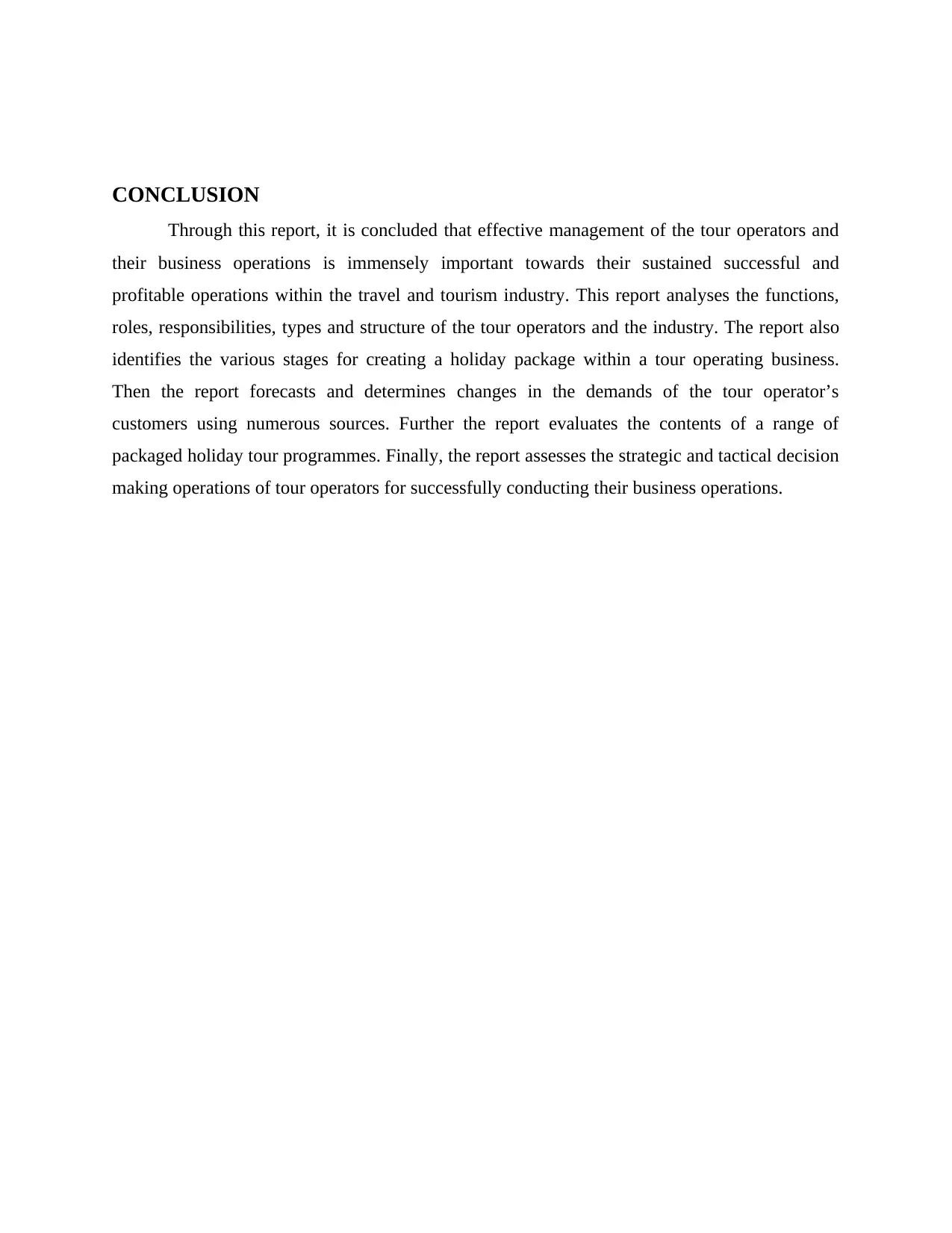
CONCLUSION
Through this report, it is concluded that effective management of the tour operators and
their business operations is immensely important towards their sustained successful and
profitable operations within the travel and tourism industry. This report analyses the functions,
roles, responsibilities, types and structure of the tour operators and the industry. The report also
identifies the various stages for creating a holiday package within a tour operating business.
Then the report forecasts and determines changes in the demands of the tour operator’s
customers using numerous sources. Further the report evaluates the contents of a range of
packaged holiday tour programmes. Finally, the report assesses the strategic and tactical decision
making operations of tour operators for successfully conducting their business operations.
Through this report, it is concluded that effective management of the tour operators and
their business operations is immensely important towards their sustained successful and
profitable operations within the travel and tourism industry. This report analyses the functions,
roles, responsibilities, types and structure of the tour operators and the industry. The report also
identifies the various stages for creating a holiday package within a tour operating business.
Then the report forecasts and determines changes in the demands of the tour operator’s
customers using numerous sources. Further the report evaluates the contents of a range of
packaged holiday tour programmes. Finally, the report assesses the strategic and tactical decision
making operations of tour operators for successfully conducting their business operations.
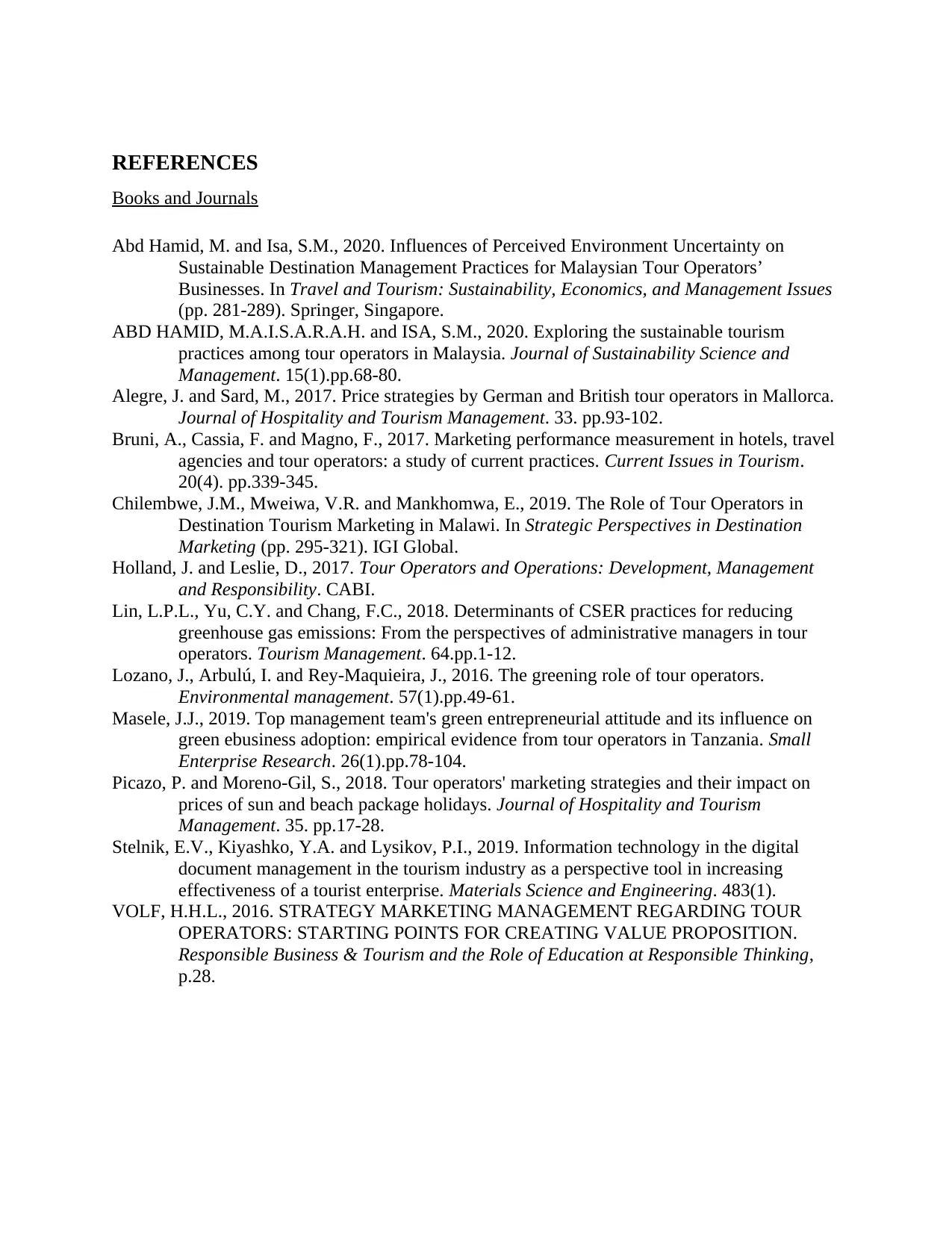
REFERENCES
Books and Journals
Abd Hamid, M. and Isa, S.M., 2020. Influences of Perceived Environment Uncertainty on
Sustainable Destination Management Practices for Malaysian Tour Operators’
Businesses. In Travel and Tourism: Sustainability, Economics, and Management Issues
(pp. 281-289). Springer, Singapore.
ABD HAMID, M.A.I.S.A.R.A.H. and ISA, S.M., 2020. Exploring the sustainable tourism
practices among tour operators in Malaysia. Journal of Sustainability Science and
Management. 15(1).pp.68-80.
Alegre, J. and Sard, M., 2017. Price strategies by German and British tour operators in Mallorca.
Journal of Hospitality and Tourism Management. 33. pp.93-102.
Bruni, A., Cassia, F. and Magno, F., 2017. Marketing performance measurement in hotels, travel
agencies and tour operators: a study of current practices. Current Issues in Tourism.
20(4). pp.339-345.
Chilembwe, J.M., Mweiwa, V.R. and Mankhomwa, E., 2019. The Role of Tour Operators in
Destination Tourism Marketing in Malawi. In Strategic Perspectives in Destination
Marketing (pp. 295-321). IGI Global.
Holland, J. and Leslie, D., 2017. Tour Operators and Operations: Development, Management
and Responsibility. CABI.
Lin, L.P.L., Yu, C.Y. and Chang, F.C., 2018. Determinants of CSER practices for reducing
greenhouse gas emissions: From the perspectives of administrative managers in tour
operators. Tourism Management. 64.pp.1-12.
Lozano, J., Arbulú, I. and Rey-Maquieira, J., 2016. The greening role of tour operators.
Environmental management. 57(1).pp.49-61.
Masele, J.J., 2019. Top management team's green entrepreneurial attitude and its influence on
green ebusiness adoption: empirical evidence from tour operators in Tanzania. Small
Enterprise Research. 26(1).pp.78-104.
Picazo, P. and Moreno-Gil, S., 2018. Tour operators' marketing strategies and their impact on
prices of sun and beach package holidays. Journal of Hospitality and Tourism
Management. 35. pp.17-28.
Stelnik, E.V., Kiyashko, Y.A. and Lysikov, P.I., 2019. Information technology in the digital
document management in the tourism industry as a perspective tool in increasing
effectiveness of a tourist enterprise. Materials Science and Engineering. 483(1).
VOLF, H.H.L., 2016. STRATEGY MARKETING MANAGEMENT REGARDING TOUR
OPERATORS: STARTING POINTS FOR CREATING VALUE PROPOSITION.
Responsible Business & Tourism and the Role of Education at Responsible Thinking,
p.28.
Books and Journals
Abd Hamid, M. and Isa, S.M., 2020. Influences of Perceived Environment Uncertainty on
Sustainable Destination Management Practices for Malaysian Tour Operators’
Businesses. In Travel and Tourism: Sustainability, Economics, and Management Issues
(pp. 281-289). Springer, Singapore.
ABD HAMID, M.A.I.S.A.R.A.H. and ISA, S.M., 2020. Exploring the sustainable tourism
practices among tour operators in Malaysia. Journal of Sustainability Science and
Management. 15(1).pp.68-80.
Alegre, J. and Sard, M., 2017. Price strategies by German and British tour operators in Mallorca.
Journal of Hospitality and Tourism Management. 33. pp.93-102.
Bruni, A., Cassia, F. and Magno, F., 2017. Marketing performance measurement in hotels, travel
agencies and tour operators: a study of current practices. Current Issues in Tourism.
20(4). pp.339-345.
Chilembwe, J.M., Mweiwa, V.R. and Mankhomwa, E., 2019. The Role of Tour Operators in
Destination Tourism Marketing in Malawi. In Strategic Perspectives in Destination
Marketing (pp. 295-321). IGI Global.
Holland, J. and Leslie, D., 2017. Tour Operators and Operations: Development, Management
and Responsibility. CABI.
Lin, L.P.L., Yu, C.Y. and Chang, F.C., 2018. Determinants of CSER practices for reducing
greenhouse gas emissions: From the perspectives of administrative managers in tour
operators. Tourism Management. 64.pp.1-12.
Lozano, J., Arbulú, I. and Rey-Maquieira, J., 2016. The greening role of tour operators.
Environmental management. 57(1).pp.49-61.
Masele, J.J., 2019. Top management team's green entrepreneurial attitude and its influence on
green ebusiness adoption: empirical evidence from tour operators in Tanzania. Small
Enterprise Research. 26(1).pp.78-104.
Picazo, P. and Moreno-Gil, S., 2018. Tour operators' marketing strategies and their impact on
prices of sun and beach package holidays. Journal of Hospitality and Tourism
Management. 35. pp.17-28.
Stelnik, E.V., Kiyashko, Y.A. and Lysikov, P.I., 2019. Information technology in the digital
document management in the tourism industry as a perspective tool in increasing
effectiveness of a tourist enterprise. Materials Science and Engineering. 483(1).
VOLF, H.H.L., 2016. STRATEGY MARKETING MANAGEMENT REGARDING TOUR
OPERATORS: STARTING POINTS FOR CREATING VALUE PROPOSITION.
Responsible Business & Tourism and the Role of Education at Responsible Thinking,
p.28.
1 out of 15
Related Documents
Your All-in-One AI-Powered Toolkit for Academic Success.
+13062052269
info@desklib.com
Available 24*7 on WhatsApp / Email
![[object Object]](/_next/static/media/star-bottom.7253800d.svg)
Unlock your academic potential
© 2024 | Zucol Services PVT LTD | All rights reserved.





